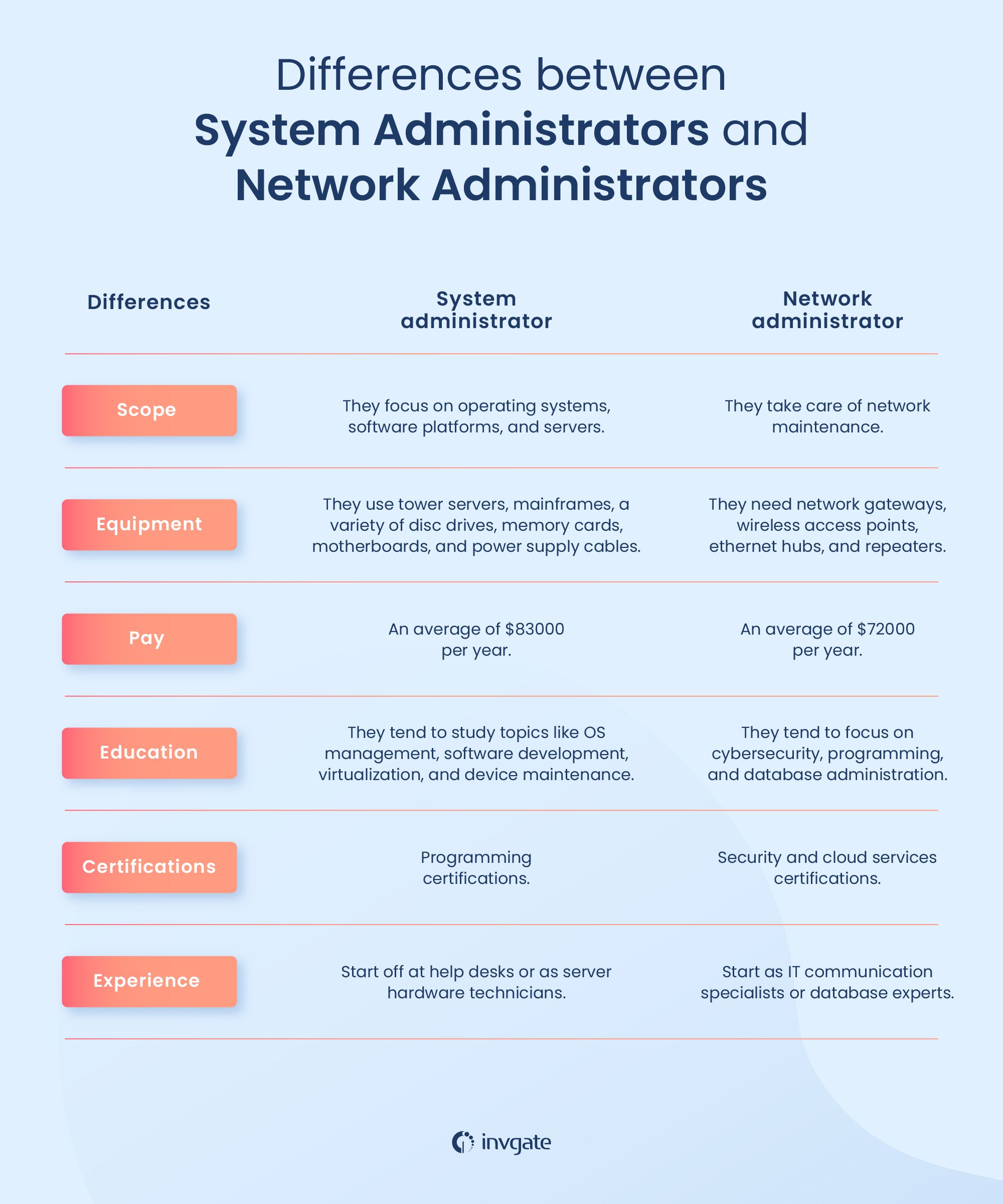There’s an abundance of career opportunities in IT. It’s hard for newcomers to find their footing in the middle of complicated terminology, with similar job roles but not equal. One of these difficulties is the system administrator vs. network administrator issue. Are they two completely different careers? Today, we’ll help dispel any confusion so you can make an informed choice.
The Bureau of Labor Statistics projects a 5% growth for network and system administrators all through 2026. That should be your first clue that, although both positions may seem interchangeable, they’re not.
In this article, we’ll try to clear up doubts about where these positions overlap and, most importantly, where they don’t. To do this, we’ll define the role of a systems administrator and a network administrator. Then, we’ll compare the two and help you choose between them depending on your strengths and skills.
Let’s start with the basics.
What is a system administrator?
System administration is a career where an expert manages computer systems. These systems can be in the form of software, hardware, workstations, or servers. The primary objective is to guarantee that these systems work smoothly.
A system administrator is one of the most critical (often referred to as “core”) IT roles. They are responsible for creating a stable, dependable work environment for your company or organization — and they surely know their way around their SysAdmin tools. They handle everything from server and network performance to cybersecurity and other areas that need a tune-up to keep things running smoothly.
So, this should give you a clear handle on the system administrator role. Let’s take a look at what a network administrator does.
What is a network administrator?
A network administrator is responsible for installing, configuring, and supporting everything related to an organization's local network, LAN wide-area network (WAN), internet systems, or segmented parts of a network system.
Of course, this may be a little or a lot, depending on how big the company they work for is.
In the case of a smaller company, for instance, a network admin may perform maintenance and update duties on network or IT systems directly. This includes overseeing network switches, setting up and monitoring VPNs (Virtual Private Networks), and using all kinds of troubleshooting tools.
But, in the case of larger companies, network administrators may find themselves facing many more responsibilities that include managerial duties. These can consist of liaising with network architects to make equipment decisions and hardware purchases or even managing teams of IT specialists.
System administrators and network administrators: similarities and differences
Both the system administrator and the network administrator are key IT roles. Part of their common ground includes maintaining and supporting IT infrastructure.
Yet, both have to focus on different areas of running computer systems, so their day-to-day operations look different. But both roles frequently overlap and affect each other, like network issues' impact on servers and vice versa. Of course, both parts often have to be among the best troubleshooters in the company as well.
Now, let’s take a look at some other areas of overlap.
Similarities between SysAdmins and Network Admins
1. Work environment
Network and system administrators work in offices, primarily on computers, utilizing different software tools. Then, they also have to move around to other sites to install and repair equipment. As a consequence of working full-time, both roles tend to have flexible overtime options and require basic travel capabilities.
2. General skills
A network administrator and a system administrator must use overlapping skills when solving network issues or problem-solving. And not only that, but both roles tend to work very closely, so they thoroughly understand each other’s technical skills.
Some of these skills are:
- General problem-solving
- Strategic thinking
- Networking and data analysis
- Hardware installation
- Cloud computing
- Scripting and programming languages
- Device management
3. General job outlook
As mentioned in the Bureau of Labor Statistics report, things look suitable for network administrators and SysAdmins. Things are looking ideal for computer science experts in general, with plenty of growth projected in the coming years.
Key differences between SysAdmins and Network Admins
We’ve established where the role of system administrator and network administrator have common ground. But, each has to fulfill different duties within a company, so understanding these differences will also help you gain perspective on the core aspects of each job.
Let’s take a look.
1. Scope
Both roles differ in their general objectives. Network administrators have to take care of network maintenance, while system administrators focus on operating systems, software platforms, and servers — it’s easier to understand this generally as a sort of “hardware vs. software” dichotomy.
A good network admin will also work more with routing, IP addresses, device scripting, proxies, and access points. Conversely, system administrators are more knowledgeable about data virtualization, inventory, analytics, and general system capacities.
2. Equipment
Both roles require knowing how to code and using a computer (in case you were wondering). But regardless, when it’s time to be hands-on, they both have to use different equipment to deal with the hardware side of the job.
A network administrator has to use equipment like network gateways, wireless access points, ethernet hubs, and repeaters. Meanwhile, a system administrator will most likely work with tower servers, mainframes, various disc drives, memory cards, motherboards, and power supply cables.
3. Pay
Money matters, and network admins and system administrators earn very cushy salaries — an average of $72000 and $83000 per year, respectively.
This is partly because of their on-call duties, with companies requiring them to fix unforeseen network issues, so there’s a lot of overtime pay.
4. Education
Education is one area where both professions resemble each other the most. For instance, employers tend to expect, at minimum, a bachelor’s degree in computer science, software engineering, or some other IT field.
But, at some point, both careers branch off to focus on either system administration or network administration. Network admins tend to focus more on cybersecurity, programming, and database administration. Conversely, SysAdmins study topics like OS management, software development, virtualization, and device maintenance.
Then, there’s the matter of perfecting these skills, which can require a master's in one of the abovementioned majors. The more experience and skills you have, the more you can apply for high-level positions.
5. Certifications
Both SysAdmins and network administrators require specialized certifications. Programming certifications, for instance, will be relevant to both roles but especially important for system administrators. Likewise, network administrators will benefit more from studying security and cloud services certifications.
6. Experience
Both professions are something you can expect to do mid-career, so they’re not things you can get into until you’re quite a few years into the IT profession. Most system administrators start at help desks or server hardware technicians. On the other end of the spectrum, network admins can get their start as IT communication specialists or database experts.
How to choose between being a network administrator or a system administrator
It’s understandable if you are still confused about which career path to take, as they’re both stimulating, challenging, and profitable positions.
Here’s our recommendation about choosing between being a network administrator or a system administrator:
- Start working with a small system. Looking for a job in a smaller company may help you understand how things work. Then you can use that on-job experience to get a feel for what you like and what you don’t. It works even better if you can work in various roles.
- Take courses in both. Not selecting means you can also try shorter SysAdmin or network administrator courses. If you find that something piques your interest, you can go deeper and give it a real shot. Remember: it’s not just about money, but what you enjoy and what comes easily.
- It’s not just about being a network administrator or system administrator, but about how far you can go. Network admins can become chief information officers, IT directors, and network architects. SysAdmins can, likewise, leverage their knowledge to become system architects or engineers.
Key takeaways
As you can see, network and system administrators have a lot in common. But, while the first tends to work more on the hardware side of things, the latter tends to focus on software and people.
Also, while there’s an overlap between how they work and work, both tend to occupy different domains. It’s essential, though, for each profession to be aware of what the other brings to the table, as they will often communicate and try to fix problems.
Both roles are critical for the success of any company’s IT and development infrastructures, though. That’s why future IT professionals must explore both. Nonetheless, being either a system administrator or a network administrator can be a prosperous, rewarding, fulfilling career path worth pursuing.
















